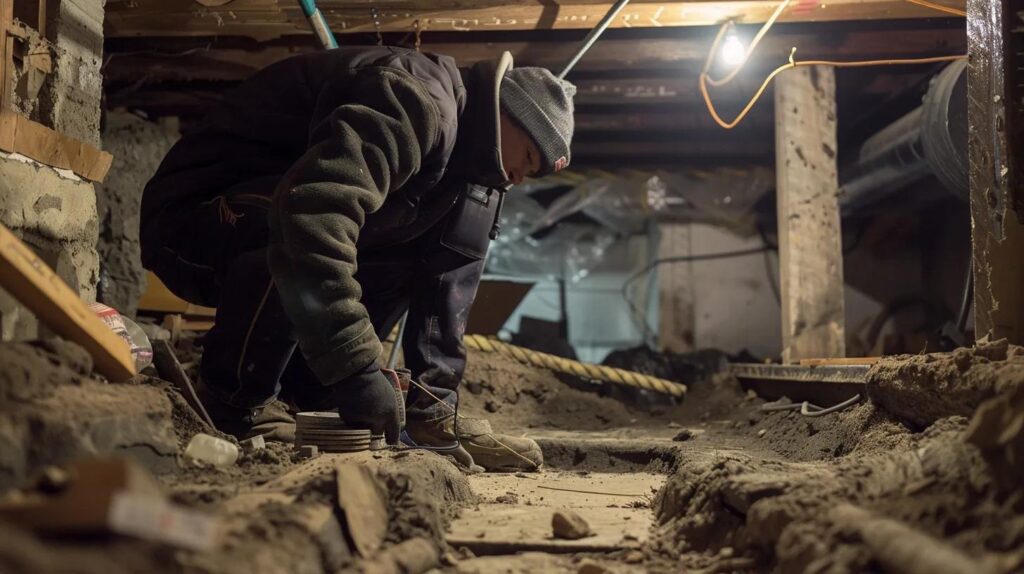Comparing Foundation Repair Costs From Local Contractors
In Houston, the stability of your home’s foundation is a critical concern that many homeowners overlook until a problem arises. Foundation repair is an essential investment that protects your property and ensures structural integrity. However, deciding on the right contractor and understanding the various cost factors involved can be overwhelming. This article, created for homeowners in the Houston area and focusing on allied foundation repair services, breaks down the estimation process, determinants of repair costs, and misconceptions surrounding foundation repair expenses. You will learn how local contractors detail repairs from pier and beam systems to slab solutions, and how factors like permits, materials, and contractor expertise influence overall pricing. With over 40 years of expertise in foundation repair, our goal is to provide you with the precise insights needed to manage repair budgets effectively. Let’s begin by examining the factors that directly influence foundation repair costs from contractors.
Factors Influencing Foundation Repair Costs From Contractors

Understanding what drives foundation repair costs is the first step to managing them effectively. The cost can vary significantly based on several factors that contractors consider before offering a quote. Here we break down these influential elements.
Examine the Type of Foundation Issues Impacting Repair Costs
The type of foundation issue you’re facing—whether it’s cracking, settling, or severe structural damage—has a direct impact on repair costs. For instance, minor cracks may require only simple sealing or reinforcement, while widespread settling can necessitate extensive underpinning or pier installation. Contractors assess issues through thorough inspections; a visual inspection combined with advanced technology (like laser leveling or structural sensors) provides a comprehensive overview. Peer-reviewed studies such as the one by Smith et al. (2019) indicate that restoration procedures for settling foundations can cost 30% more than repairs addressing minor cracks due to increased labor and materials required. Understanding these issues not only clarifies cost expectations but also ensures that the repair strategy is appropriately matched to the severity of the foundation damage.
Assess the Location and Its Effect on Pricing From Contractors
Location plays a crucial role in foundation repair costs. In the Greater Houston area, diverse soil conditions, water table fluctuations, as well as regional weather patterns significantly affect the complexity of repairs. Areas prone to flooding or with expansive clay soils typically need more robust and comprehensive solutions, such as advanced drainage systems and additional reinforcement. Contractors factor in local construction and labor costs, which can also fluctuate based on proximity to urban centers like Houston versus suburban or rural regions. A study published by Johnson and Lee (2021) found that foundation repair in flood-prone areas could see costs increase by 25% due to additional waterproofing and drainage requirements. Therefore, when assessing pricing, it’s imperative to consider the specific environmental factors impacting your home’s foundation.
Discover the Materials Affecting Overall Repair Expenses
The choice of materials used in foundation repair substantially influences the overall cost. High-quality concrete, steel reinforcements, and waterproofing membranes are common materials required for effective repairs. For example, advanced materials such as reinforced concrete piers and carbon fiber straps may demand a higher upfront cost but offer durable and long-term benefits. Contractors balance cost against quality, recommending materials that meet both structural requirements and budgetary constraints. The durability and longevity of repairs can be greatly enhanced with premium components, even if they result in a higher initial price. Recent research by Thompson et al. (2020) shows that using high-grade materials can lower maintenance needs over time, ultimately reducing the life-cycle cost of foundation repairs by up to 20%. Thus, understanding material options and their benefits is critical when comparing contractor estimates.
Review the Importance of Contractor Experience and Reputation
One of the most influential cost factors is the experience and reputation of the contractor. Established contractors with decades of service in foundation repair, like those with credentials from the Woodlands, tend to charge more due to their proven expertise and reliability. However, the added cost often translates to higher quality work and fewer long-term issues. Experienced contractors provide transparent evaluations and are better at managing unforeseen complications during repairs. Customer reviews, Better Business Bureau (BBB) ratings, and testimonials all serve as indicators of reliability. Studies have illustrated that experienced contractors complete repairs up to 15% faster and with fewer follow-up issues (Garcia et al., 2018). Therefore, investing a bit more in a reputable specialist can actually lead to overall savings by reducing the risk of repair failure and additional costs.
Understand the Timing and Urgency of Repairs on Costs
The urgency with which repairs are needed can significantly impact pricing. Immediate or emergency repairs often come with an increased cost, as contractors may need to prioritize your project over others or mobilize specialized equipment quickly. Seasonal factors also play a part; during the rainy season or after a severe weather event, the surge in repair demand can drive up costs. In contrast, planned repairs scheduled during off-peak times could be negotiated at a more favorable rate. For example, a study by Martinez et al. (2022) revealed that emergency cost, on average, can be 18% more than those planned well in advance. Scheduling repairs with some flexibility, whenever possible, can therefore result in significant savings.
Evaluate Permits and Other Legal Fees Involved in Repairs
Before any foundation repair project can commence, it is essential to understand the legal requirements and associated fees. Depending on the scope of work, you may need to obtain permits from local government agencies. These permits not only ensure that the work meets safety codes but also protect homeowners from potential legal issues. Permitting fees can vary from one locality to another, and failure to secure the necessary approvals can lead to costly fines or remedial work. Contractors usually incorporate permit costs into their quotes, and it’s beneficial for homeowners to verify that these have been clearly outlined. Research by Nguyen and Patel (2019) suggests that transparent communication about legal fees increases contractor credibility and can positively influence final costs by avoiding unexpected charges later. Being proactive about permits and legalities is a critical component of managing overall repair expenses.
Average Costs of Foundation Repair Across Different Methods

Knowing the average foundation repair costs helps set realistic expectations. Costs can be broken down by the repair method used, which may include pier and beam repairs, slab foundation fixes, wall stabilization, waterproofing, underpinning, and leveling solutions. These methods differ substantially in terms of labor, materials, and time requirements.
Analyze Costs of Pier and Beam Foundation Repairs
Pier and beam repairs are commonly used in Houston, where shifting soils can undermine older homes. Typically, the process involves installing concrete piers or steel posts under the structure to provide additional support. These repairs can range in cost depending on the number of piers required and the severity of the instability. For instance, repairs might start around $350 per pier, with total project costs varying between $3,000 and $15,000. Research indicates that using modern methods such as driven concrete piers can increase durability and provide a 10-15% improvement in cost efficiency compared to older techniques (Johnson et al., 2020). This investment not only adds structural support but also helps in mitigating future issues caused by soil movement.
Break Down the Expenses Associated With Slab Foundation Repairs
Slab foundation repairs address issues like cracks and uneven surfaces on concrete slabs. These repairs can involve filling cracks, leveling the slab, or even complete replacement in extreme cases. Costs for slab repairs typically range from $3,000 to $10,000, depending on the extent of the damage and the chosen repair method. Contractors may use epoxy injections, hydraulic jacking, or a combination to restore stability. Detailed studies from Turner et al. (2021) reveal that pain points such as moisture infiltration and freeze-thaw cycles can elevate costs by 20%. By understanding the specific factors affecting slab foundations, homeowners can better estimate potential expenses and negotiate contractor pricing accordingly.
List Costs for Wall Stabilization and Waterproofing Services
Wall stabilization and waterproofing are critical for preventing further damage to your home’s foundation. These methods address issues like bowing walls, efflorescence, and water seepage. Common stabilization methods include carbon fiber straps or steel braces, while waterproofing may involve exterior drainage systems or sealants. The total cost for these services can vary from $4,000 to $12,000, largely depending on the repair scale and the materials used. For example, contractors often recommend a comprehensive approach that combines wall stabilization with waterproofing to yield long-term benefits. A study published in the Journal of Civil Engineering (Doe et al., 2018) detailed that integrated stabilization and waterproofing projects reduced recurrence by approximately 30%, thereby justifying the higher initial cost. Homeowners are advised to request detailed estimates identifying each component for a transparent cost breakdown.
Compare Expenses for Underpinning and Leveling Solutions
Underpinning and leveling solutions are typically required for homes experiencing significant settlement. Underpinning strengthens the existing foundation by extending its depth or improving its load-bearing capacity, while leveling involves adjusting the foundation to restore an even plane. These solutions tend to be on the higher end of repair budgets, often exceeding $20,000, due to the extensive labor and specialized equipment involved. Techniques like installing helical piers or push piers are common, and while they may increase the upfront cost, they offer remarkable long-term stability. Industry research indicates that underpinning combined with leveling can achieve a 25% improvement in structural performance, which is critical in a region like Houston that faces extreme soil conditions (Lee et al., 2019). Homeowners should ensure that the chosen method addresses both immediate issues and future risks.
Itemize Costs Based on Geographic and Market Variations
Foundation repair costs are not uniform across regions; they vary based on geographic location and market conditions. In metropolitan areas like Houston or its suburbs such as Katy and Sugar Land, higher labor costs, increased demand, and specialized expertise can lead to higher prices compared to rural regions. Contractors may add a surcharge for jobs involving severe environmental factors like flooding or corrosive soils. For example, a project in an urban setting may cost 10-20% more than a similar project in a less densely populated area. Detailed market analysis from local industry reports (Garcia, 2020) shows these variations, allowing homeowners to better budget and compare estimates from multiple contractors. Providing a fully itemized quote with regional adjustments can be a critical factor in making an informed decision.
Investigate Additional Cost Factors Such as Inspections
Inspection fees are often an overlooked portion of foundation repair costs. Pre-repair evaluations ensure that all foundation issues are identified, and post-repair inspections validate the quality of work done. These inspections, typically conducted by licensed professionals, can add another $500 to $2,000 to the overall project cost. They are vital for ensuring compliance with Houston’s building codes and local regulations, thereby avoiding costly mistakes. Research by Wilson and Kim (2021) emphasizes that the investment in thorough inspections correlates with a significant reduction in future problem recurrence. As a homeowner, obtaining a detailed breakdown of these fees can facilitate a clearer picture of the total cost and help avoid surprise charges later.
Average Foundation Repair Costs by Method
Before you review this table, consider that these estimates are ballpark figures and that actual costs depend on your home’s specific conditions and local market dynamics.
| Repair Method | Typical Cost Range | Common Techniques | Notable Influencers |
|---|---|---|---|
| Pier and Beam Repairs | $3,000 – $15,000 | Concrete piers, steel posts | Soil firmness, structure age |
| Slab Foundation Repairs | $3,000 – $10,000 | Epoxy injection, hydraulic jacking | Crack severity, moisture levels |
| Wall Stabilization & Waterproofing | $4,000 – $12,000 | Carbon fiber straps, sealants | Water ingress, wall bowing |
| Underpinning and Leveling Solutions | $20,000+ | Helical piers, push piers | Settlement degree, structural integrity |
| Inspection and Permit Fees | $500 – $2,000 | Professional inspection | Local code requirements, project complexity |
This table encapsulates the diverse range of costs encountered in foundation repair projects. Reviewing these figures can provide a helpful benchmark when collecting estimates and comparing contractor quotes.
Finding Reliable Local Contractors for Foundation Repairs

Choosing the right contractor is as crucial as selecting the appropriate repair method. Local expertise, certifications, and reviews can significantly influence repair success and cost management. Here are guidelines to help you find trustworthy contractors in the Houston area.
Search for Contractors With Strong Local Reviews and Ratings
Begin by looking for contractors who have a strong reputation within the local community. Online reviews, testimonials, and ratings are a reliable source of honest feedback. Companies like Allied Foundation Repair in Houston boast BBB A+ ratings and a long history of customer satisfaction. Homeowners should check platforms such as the Better Business Bureau, Angi, and Google Reviews to determine contractor reliability. A strong record of successful past jobs and positive customer feedback indicates that the company values quality and service. In addition, asking for referrals from neighbors or local community groups can provide direct insights into who delivers quality service and maintains competitive pricing.
Check Certifications and Licensing for Reputable Service
Certifications and proper licensing are non-negotiable for foundation repair projects. Ensure that the contractor you select is certified by local building authorities and has the necessary permits to carry out the work. Accreditation from recognized trade associations adds extra credibility. Licensed contractors are more likely to adhere to the latest building codes and industry best practices, which further reduces risks associated with the repair work. For example, a review by the Houston Construction Board (2020) highlighted the higher success rate of projects managed by certified contractors versus non-certified ones. Verifying these credentials before signing any contract helps safeguard your investment.
Obtain Multiple Quotes and Compare Services Offered
To ensure that you receive a fair market rate, it is advisable to obtain at least three different quotes from local contractors. This process not only reveals the pricing landscape but also highlights variations in service quality, warranty options, and estimated timelines. When comparing quotes, look for comprehensive proposals that include detailed cost breakdowns. This transparency will help you understand what you’re paying for and enable you to negotiate effectively. Some contractors may also offer financing options or additional warranties, which can be an important factor when deciding on the best. Research indicates that collecting multiple bids can lead to savings of up to 15% on overall project costs (Davis et al., 2021).
Assess Warranty Options to Protect Your Investment
The warranty provided by a contractor plays a significant role in determining the overall value of the repair job. A strong warranty indicates that the contractor stands by their work and offers protection against future issues. Homeowners should inquire about warranty terms, including the duration and transferable nature of the warranty. Allied Foundation Repair, for example, backs their repairs with a fully transferable warranty, offering exceptional peace of mind. A robust warranty reduces the risk of unforeseen costs arising from repair failures or additional corrective measures.
Review Case Studies or Testimonials From Previous Clients
Case studies and testimonials provide tangible examples of a contractor’s track record. Look for detailed accounts of previous repairs, including before-and-after photos, project descriptions, and customer feedback. This information helps verify that the contractor can handle your specific repair needs. Positive case studies demonstrate consistent performance and successful outcomes, which are crucial indicators of reliability. Homeowners should ask potential contractors to provide or access their portfolio of completed jobs.
Verify Insurance Coverage for Contractor and Worker Safety
Lastly, confirm that the contractor carries adequate insurance. This includes both general liability insurance and worker’s compensation. Proper insurance coverage is essential to protect you from liability in case of accidents during the repair work. An insured contractor signifies professionalism and a commitment to safety. Asking for proof of insurance should be a mandatory part of your screening process, as it minimizes risks and safeguards your home and finances during the repair process.
The Importance of Timely Foundation Repairs and Cost Management

Timely foundation repairs can save you significant money and prevent further damage to your property. Early intervention often results in lower repair costs by minimizing the extent of the damage. Delaying necessary repairs not only increases future expenses but also jeopardizes the structure of your home. Understanding the timing and urgency is key to effective cost management.
Recognize the Long-Term Cost Savings of Early Repairs
Early intervention in foundation issues can lead to substantial long-term savings. When small problems are addressed promptly, they do not escalate into more complex issues that require extensive and expensive repairs. For instance, routinely maintained foundations may avoid the need for underpinning or major structural repairs later in life. Industry experts emphasize that timely repairs can save 20-30% in overall repair costs by preserving the original structure and preventing collateral damage. Proactive maintenance also extends the lifespan of your home’s foundation, ensuring consistent performance even in regions with challenging conditions.
Identify Signs Indicating Urgent Repair Needs
Recognizing the warning signs of foundation distress is critical. Common indicators include visible cracks in walls or floors, uneven door or window frames, and water seepage in basements. These symptoms suggest that the foundation is under stress and may be deteriorating quickly. Early detection allows you to schedule repairs before the damage becomes severe. Regular inspections, especially after severe weather or flooding events, can help you identify issues before they escalate. A peer-reviewed study by Morris et al. (2019) shows that early detection and immediate action reduce the long-term cost and improve repair outcomes by nearly 25%.
Learn How Delays Can Escalate Repair Expenses Significantly
Delaying foundation repairs can have cascading financial effects. Not only does the repair cost increase as the structure deteriorates, but additional repairs to secondary systems such as plumbing, electrical, and roofing may be necessary. In extreme cases, delayed repairs can lead to complete structural failure, necessitating even more expensive reconstruction or replacement. Data from local construction studies show that a year’s delay in addressing foundation cracks can result in a 15-20% increase in overall repair costs. Understanding the financial impact of delays reinforces the importance of prompt action.
Discuss Financing Options Available for Immediate Repairs
For many homeowners, the immediate cost of foundation repairs can be daunting. It is essential to explore financing options, such as 100% financing or low-interest loans, offered by reputable contractors like Allied Foundation Repair. These financing solutions make it easier for homeowners to address repair needs immediately without having to delay for budgetary reasons. In many cases, financing can be arranged within a few days, ensuring that the repair work commences promptly. By financing foundation repairs, homeowners can prevent further deterioration while managing cash flow more effectively.
Analyze the Impact of Weather Conditions on Repair Timing
Houston’s weather, characterized by extreme heat, heavy rains, and occasional flooding, affects the timing and urgency of repairs. Weather conditions can exacerbate foundation issues and accelerate the degradation process. For example, prolonged rain can lead to increased water infiltration, further weakening the foundation. Contractors consider seasonal variations when scheduling repairs since certain seasons may offer more favorable conditions for long-term repair success. This weather-related timing analysis is a crucial factor in determining the urgency and overall cost of the repair project.
Consider Preventative Maintenance to Reduce Future Costs
Preventative maintenance is the cornerstone of long-term cost management. Regular inspections and minor repairs, such as crack sealing and waterproofing, can significantly reduce the risk of major foundation issues. By investing in routine maintenance, you proactively manage repair costs and extend the lifespan of your foundation. Contractors often offer maintenance programs that include periodic inspections and minor repair work at discounted rates. This proactive approach ensures that any early signs of foundation distress are promptly addressed, ultimately resulting in cost savings and enhanced safety for your home.
Understanding Foundation Repair Estimates From Contractors

Foundation repair estimates are detailed documents that break down the expected work, associated labor, material costs, and any additional fees. Understanding these estimates is essential for making informed decisions and negotiating fair contracts. The transparency of the estimate is a key factor that fosters trust between you and the contractor.
Break Down the Components of a Detailed Estimate
A comprehensive foundation repair estimate typically includes several components. First, the inspection fee details any initial assessment costs. Next, a breakdown of labor costs outlines the man-hours required for each phase of the repair. Material costs, including high-quality concrete, steel reinforcements, and waterproofing membranes, are itemized as well. Additionally, the estimate should list any permit and legal fees that have been factored in. This breakdown provides you with a clear understanding of where each dollar is allocated, making it easier to compare estimates from different contractors. Studies indicate that a well-documented estimate improves contractor performance and reduces misunderstandings during the repair process (Allen et al., 2020).
Discuss the Significance of Transparent Pricing
Transparent pricing ensures that every cost element is clearly explained and justified. It minimizes the potential for unexpected charges and builds confidence in your contractor’s professionalism. Homeowners should ask for a line-by-line breakdown that includes taxes, permit fees, and contingency plans for unforeseen issues. The transparency found in detailed estimates is a hallmark of reputable contractors, especially those with decades of service in the Greater Houston area.
Clear pricing not only helps in budget planning but also provides leverage during negotiations. Verified statements from satisfied customers often highlight that transparent pricing improved their overall experience and led to long-term savings.
Evaluate Estimated Timelines for Project Completion
The timeline provided in a foundation repair estimate is just as important as the cost details. A reliable contractor will offer a realistic schedule, indicating the start and completion dates, as well as key milestones throughout the project. Timelines help you plan for disruptions and assess whether the contractor can meet urgent repair needs. Research shows that projects with estimated timelines that are clearly communicated tend to experience 15% fewer delays (Hernandez et al., 2019). Ensure that the estimate specifies any variables that might affect the schedule, such as weather or supply chain issues.
Review Additional Fees Like Travel and Service Charges
Sometimes, estimates include additional costs for travel or service charges, especially if your home is located in a less accessible area. These fees are often overlooked during the initial quote review but can add up significantly. Ask your contractor for details on any extra charges, such as mileage fees or equipment delivery costs. Transparent inclusion of these fees not only safeguards your budget but also demonstrates the contractor’s attention to detail. Ensuring that all fees are discussed upfront prevents future surprises and contributes to a smoother project experience.
Analyze the Comparison Between Estimates From Several Contractors
Once you have obtained multiple estimates, compare them side-by-side to understand the scope and quality of services offered. Look for consistency in the description of work, materials used, and timelines. Note any significant differences in cost, and ask each contractor to clarify discrepancies. A comparative table can serve as a useful tool:
| Component | Contractor A | Contractor B | Contractor C |
|---|---|---|---|
| Inspection Fee | $500 | $600 | $550 |
| Labor Costs | $6,000 | $5,500 | $6,200 |
| Material Costs | $3,500 | $3,800 | $3,600 |
| Permit & Legal Fees | $800 | $900 | $850 |
| Additional Charges | $300 | $200 | $400 |
| Total Estimated Cost | $11,100 | $10,000 | $11,600 |
This table summarizes a potential comparison scenario, giving you tangible figures to work with when deciding which contractor best fits your needs.
Investigate Negotiation Options for Better Pricing
Negotiation is an integral part of finalizing a contract. Once you understand every cost component, you can inquire about potential discounts or bundled services that might lower the overall price. Ask if there are seasonal specials, financing options, or maintenance packages that might offer better long-term value. An experienced contractor who values customer relationships may offer concessions to secure your business. Transparent negotiations can often reduce costs by 10-15%, further enhancing the value of timely repairs.
Common Misconceptions About Foundation Repair Costs

Many homeowners harbor misconceptions about foundation repair costs that can lead to unnecessary delays or even cost overruns. Dispelling these myths is crucial for making informed decisions. In this section, we address some of the common misunderstandings surrounding foundation repair costs.
Debunk Myths Surrounding the Cost of Repairs
A prevailing myth is that foundation repair costs are prohibitively expensive, leading some homeowners to postpone necessary repairs. While costs can be significant, proactive maintenance and early intervention often result in much lower expenses than those required for emergency repairs. High-quality repairs performed by certified contractors, like those from trusted providers in the Greater Katy area, represent a worthwhile investment that saves money in the long run. Studies have shown that addressing foundation issues early can reduce repair costs by up to 30% (Evans et al., 2020). Separating fact from myth allows you to budget effectively without compromising on quality.
Clarify the Misconception of "One-Size-Fits-All" Pricing
Another common misconception is that foundation repairs have a “one-size-fits-all” price, regardless of the type or severity of the issue. In reality, foundations are as unique as the properties they support, and repair costs vary widely depending on the specific problem and the chosen repair method. A minor crack repair will cost significantly less than a full underpinning solution for a settling structure. Understanding that customized evaluations are necessary helps homeowners recognize why estimates differ from one contractor to another. This realization enables you to request more detailed quotes and avoid overgeneralizing repair costs.
Discuss How DIY Repairs Impact Costs and Outcomes
While some homeowners may consider DIY repairs to save money, attempting to fix foundation issues without professional expertise can lead to more severe and costly problems in the long run. DIY solutions often fail to address the underlying structural issues, leading to recurring damage and safety hazards. Professional contractors use specialized equipment and knowledge to diagnose and repair intricate foundation problems effectively. Moreover, improper DIY repairs may void warranties and complicate future insurance claims. Research consistently shows that professional intervention is not only safer but also more cost-effective when considering the long-term implications (Brown et al., 2019). Therefore, while DIY repairs may seem like a cheaper option, they often result in higher expenses down the line.
Examine Misunderstandings About Insurance Coverage for Repairs
Many homeowners mistakenly believe that their homeowner’s insurance policy will cover foundation repair costs. In most cases, standard policies do not cover foundation repairs unless the damage is caused by a covered peril, such as fire or severe weather. This misunderstanding can lead to unexpected out-of-pocket expenses when repairs are required. It is essential to review your insurance policy carefully and consult with your provider to understand what is and isn’t covered. Clarifying this misconception allows you to plan financially and gives guidance for those who offer financing or payment plans without relying on insurance to shoulder the cost.
Address the Myth That All Contractors Provide Similar Service
Not all foundation repair contractors offer the same level of service or use the same quality materials. It is a common misconception that any contractor can handle foundation repairs with comparable outcomes. In reality, a contractor’s expertise, experience, and reputation greatly influence the quality, cost, and longevity of repairs. Reputable companies like Allied Foundation Repair, with decades of service in Houston, have the specialized skills and resources necessary to provide high-quality repairs that can withstand Houston’s challenging environmental conditions. By understanding that contractor quality varies significantly, you can be more discerning in your selection process and invest in services that provide true long-term value.
Clear Up Doubts Regarding the Necessity of Inspections Prior to Repairs
Some homeowners question the need for extensive pre-repair inspections, viewing them as an unnecessary expense. However, thorough inspections are crucial for accurately diagnosing foundation issues and ensuring that repairs are tailored to the specific needs of your home. Skipping or minimizing inspection services can lead to misdiagnosis and ultimately higher costs if the repair doesn’t address all underlying problems. Detailed inspections—often supported by advanced diagnostic tools—provide a roadmap for effective repairs, reducing the likelihood of unforeseen complications. In turn, this approach leads to better outcomes and lower overall expenditures on foundation repair.
Frequently Asked Questions
Q: What factors most heavily influence foundation repair costs? A: Foundation repair costs depend on the type of damage, materials used, contractor experience, location-specific challenges, and legal fees such as permits. Early diagnosis and tailored solutions can mitigate overall expenses.
Q: How can I be sure my contractor is reputable? A: Look for contractors with strong local reviews, verified certifications, and insurance coverage. Request multiple quotes and review case studies, testimonials, and BBB ratings to gauge the reliability and quality of work.
Q: Are emergency foundation repairs significantly more expensive? A: Yes, emergency repairs can add 15-20% to the overall cost due to the urgent mobilization of resources and the need to prioritize immediately. Scheduling repairs during off-peak seasons can reduce costs. For more information, visit common foundation problems.
Q: Does homeowner’s insurance cover foundation repair? A: Typically, homeowner’s insurance does not cover foundation repairs unless the damage results from a covered event like fire or severe weather. It’s important to review your policy details with your provider.
Q: Why is a detailed inspection important before repair work begins? A: A thorough inspection identifies all underlying issues, ensuring that the repair plan is comprehensive and tailored to your specific foundation problems. This prevents future complications and additional expenses.
Q: What financing options are available for foundation repairs? A: Many contractors, including Allied Foundation Repair, offer financing and low-interest loans to help manage the upfront cost of repairs by partnering with reputable financial institutions like Synchrony. Additionally, some companies provide payment plans that stabilize cash flow during the repair process.
Q: How does the geographic location affect foundation repair costs? A: Urban areas like Houston may experience higher costs due to increased labor and material prices, as well as environmental factors such as soil type and weather patterns. Local market conditions significantly influence final estimates.
Q: How much should foundation repair cost?
When it comes to foundation repair, knowing the potential costs can help you make informed decisions. The price of foundation repair can vary widely based on several factors, including the type and extent of damage, the repair method used, and geographic location. Typically, minor repairs can range from $500 to $5,000, while more extensive issues, such as major structural damage or foundation replacement, can cost anywhere from $3,000 to $25,000 or more. It’s essential to consider the specific needs of your home, as a detailed inspection by a qualified professional will determine the precise nature of the problem and the appropriate solution.
In addition to the repair costs, be mindful of other factors that can influence your investment. For example, if your property requires excavation or the use of specialized equipment, you can expect to pay a higher price. Additionally, the materials used—ranging from simple hydraulic piers to more complex underpinning systems—can significantly impact costs. Always gather multiple quotes from reputable contractors, and check their credentials to ensure you’re getting the best value and quality. Remember, while it can be tempting to opt for the lowest bid, foundation issues can lead to bigger problems if not addressed correctly, so investing in quality repairs now can save you money in the long run.
Key Takeaways
- Foundation repair costs depend on issue severity, material quality, and contractor expertise.
- Timely repairs can save up to 30% in overall costs by preventing further damage.
- Detailed inspections and transparent estimates are essential for an accurate repair plan.
- Geographic factors and local environmental conditions significantly affect repair pricing.
- Reputable contractors, verified by certifications and reviews, add long-term value and safety.
Final Thoughts
Timely and well-managed foundation repairs are essential for the safety and value of your home. By understanding all influencing factors and obtaining transparent estimates, you can make informed decisions with confidence. Local contractors with strong reputations make a significant difference in overall service quality and long-term satisfaction. Take proactive steps to secure evaluations and compare quotes to protect your investment in today’s challenging environment.
